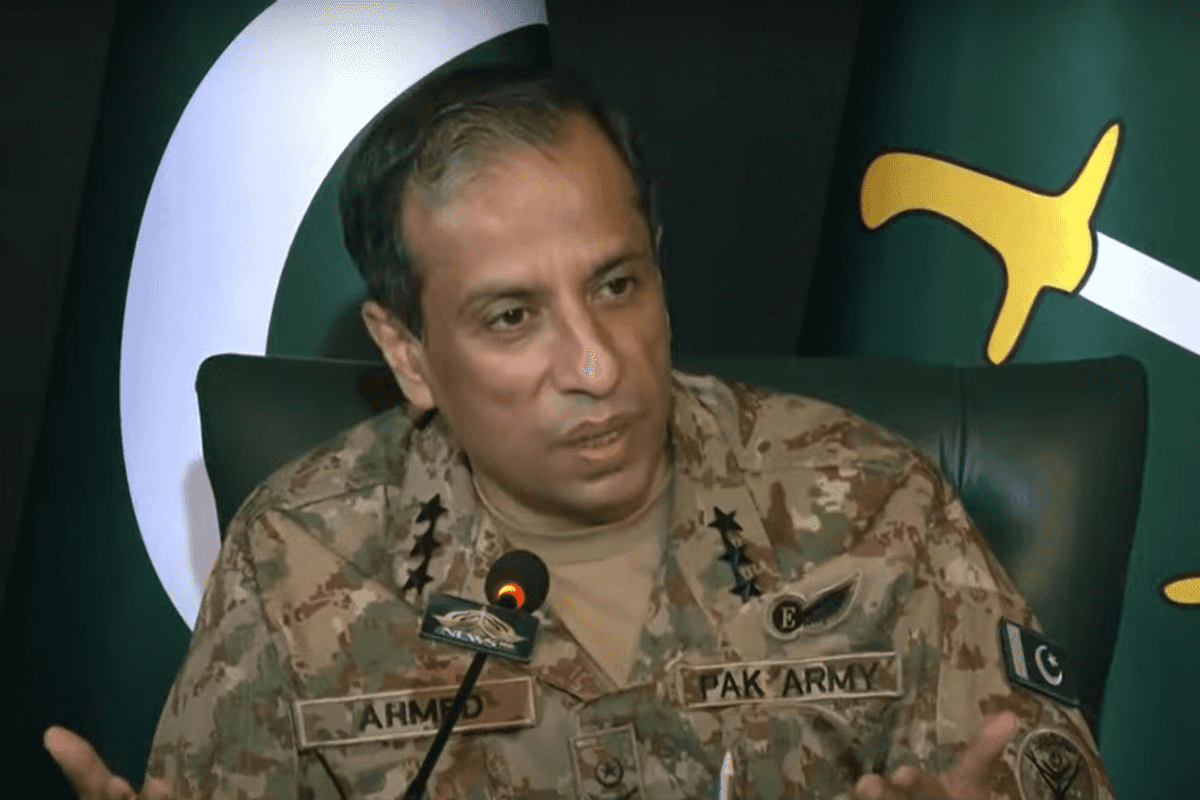News Desk
The News Desk provides timely and factual coverage of national and international events, with an emphasis on accuracy and clarity.

DG ISPR Lt. Gen. Ahmed Sharif Chaudhary during a press conference.
PTV
Pakistan’s military on Sunday said its response to recent Indian attacks was measured, targeted, and aimed solely at military sites, warning that war between the two nuclear-armed nations threatens the lives of 1.6 billion people.
“There is no space for war between Pakistan and India,” said Lt. Gen. Ahmed Sharif Chaudhary, Director General of Inter-Services Public Relations (ISPR), during a press briefing. “Initiating a conflict between two nuclear powers is stupidity.”
The briefing in Islamabad included Vice Admiral Rab Nawaz and Air Vice Marshal Aurangzeb Ahmed.
Lt. Gen. Ahmed Sharif Chaudhary rejected reports that an Indian pilot was in Pakistani custody.
“This is fake news spread on social media. Pakistan has no Indian pilot in its custody,” he said.
He said Pakistan never requested a ceasefire, but that India did so after Pakistan launched its retaliatory operation.
“We responded to the Indian request after completing our operation, and only after international interlocutors became involved,” he said.
Chaudhary emphasized that Pakistan remains committed to peace and continues to observe the ceasefire along the Line of Control.
“We are celebrating peace today. It makes no sense to violate the ceasefire now,” he said. “But if there is aggression, we will respond.”
Gen. Chaudhary said Pakistan had fulfilled its promise of justice after Indian strikes that killed civilians.
“We promised that when Pakistan strikes, the whole world will hear it — and the world did,” he said.
He confirmed that Pakistan struck 26 military targets inside India and Indian-administered Kashmir in a retaliatory operation named “Bunyan-un-Marsus” (iron wall).
Targeted sites included Indian Air Force bases in Suratgarh, Sirsa, Bhuj, Naliya, Adampur, Bathinda, Udhampur, Srinagar, Pathankot, and Jammu.
Other targets, according to Pakistan, included BrahMos missile facilities in Beas and Narota, S-400 air defense systems in Adampur and Bhuj, a supply depot in Uri, and a 10th Brigade command center in Kupwara-Gurez (KG Top).
Chaudhary claimed Indian military headquarters causing casualties in Pakistan-administered Kashmir were “relentlessly targeted until they raised white flags.”
He said Pakistan also carried out a limited cyberattack to temporarily suspend communications at Indian military facilities.
“Pakistan used, with restraint, high-tech capabilities,” he said, noting that other military assets had been kept hidden “for future surprises.”
All three branches of Pakistan’s armed forces coordinated the operation, he said, including the use of F1 and F2 long-range missiles and armed drones.
Chaudhary added that dozens of Pakistani drones flew over high-value Indian sites, including New Delhi and Gujarat, as a show of cyber and military prowess.
He stressed that Pakistan’s response was carefully calibrated to avoid civilian casualties.
“Our religion and culture do not allow us to target civilians,” he said.
India used drones to instill fear in Pakistan, Chaudhary claimed, adding that Pakistan’s air defense intercepted drones and missiles with “near-total effectiveness.”
He confirmed that only one Pakistani aircraft was slightly damaged and would soon be operational.
Chaudhary reiterated that Kashmir remains the core issue between the two countries.
“Peace cannot come to the region unless the Kashmir dispute is resolved according to the wishes of the Kashmiri people,” he said.
He also accused India of escalating terrorist activity during Pakistan’s operation, calling it proof of Indian involvement in terrorism inside Pakistan.
“Despite this, we carried out effective counterterror operations on our western border without pause,” he said.
"Pakistan's armed forces received overwhelming public support and would act decisively to protect the country’s territorial integrity," he added.
Ceasefire
Amid rising hostilities and fears of further escalation between India and Pakistan, U.S. President Donald Trump broke the tension with a dramatic announcement on Saturday -- declaring that both countries had agreed to a “full and immediate ceasefire,“ bringing a moment of calm to an otherwise volatile standoff.
As per reports, Pakistan and India agreed to allow the U.S. president to announce the ceasefire.
"After a long night of talks mediated by the United States, I am pleased to announce that India and Pakistan have agreed to a FULL AND IMMEDIATE CEASEFIRE."
President Trump extended congratulations to both Countries on using Common Sense and Great Intelligence in a post on Truth Social.
India confirms losses
Earlier, India’s military confirmed that it suffered combat losses during recent hostilities with Pakistan, while declining to provide specific details about any downed aircraft.
The admission came during a press briefing on “Operation Sindoor,” India’s military campaign against Pakistan, amid heightened cross-border tensions.
During the press briefing, Air Marshal A.K. Bharti, Director General of Air Operations for the Indian Air Force, dodged questions regarding Pakistan’s claim of shooting down Indian jets.
“Military losses are a part of combat; the question that should be asked is whether India has achieved its objective, which it has,” Bharti said.
He did not specify how many Indian aircraft had been lost.
Bharti also claimed that Indian forces had shot down “a few” Pakistani jets but declined to provide evidence or numbers.
“We prevented Pakistani jets from coming inside our territory, so we do not have the records with us,” he said. “We are getting into the technical details, but I would not like to put a figure to it.”
The military also confirmed casualties among its ground forces.
Lt. Gen. Rajiv Ghai, Director General of Military Operations, said five Indian soldiers had been killed during the operation.
“I pay my solemn homage to my five colleagues from the armed forces who have lost their lives during Operation Sindoor,” Ghai said.







Comments
See what people are discussing